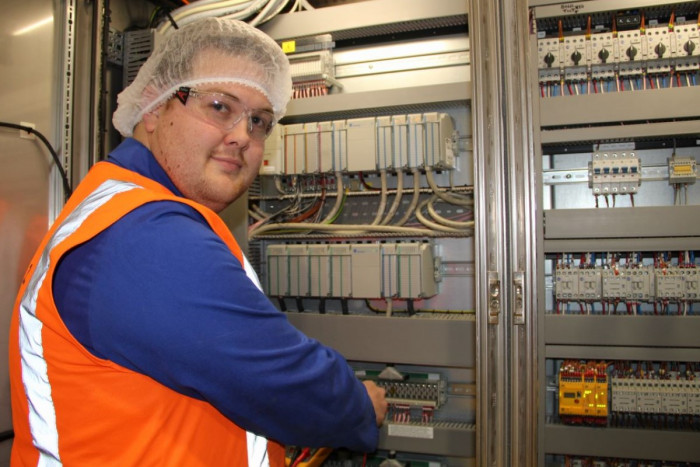Electrical Engineering Technician
Kaihangarau Take Pūhiko
Alternative titles for this job
Electrical engineering technicians interpret the designs and technical instructions of electrical engineers, then ensure they are accurately carried out. They also develop, install, test and maintain equipment that produces, transmits or uses power.
Pay
New electrical engineering technicians usually earn
$24-$27 per hour
Senior electrical engineering technicians usually earn
$34-$43 per hour
Source: Allied Work Force, 2019; Technical Recruitment Solutions, 2019.
Job opportunities
Pay
Pay for electrical engineering technicians varies depending on experience.
- Graduate electrical engineering technicians usually earn between minimum wage and $27 an hour.
- Mid-level electrical engineering technicians with three to five years' experience usually earn $28 to $32 an hour.
- Senior electrical engineering technicians with more than five years' experience usually earn $34 to $43 an hour.
Sources: Allied Work Force, 2019; Technical Recruitment Solutions, 2019; and careers.govt.nz research, 2019.
- PAYE.net.nz website - use this calculator to convert pay and salary information
- Employment New Zealand website - information about minimum wage rates
(This information is a guide only. Find out more about the sources of our pay information)
What you will do
Electrical engineering technicians may do some or all of the following:
- understand and follow electrical plans and instructions
- install, repair, test, and maintain test models of electrical systems
- record data on testing techniques, equipment, and other work
- report findings and results to colleagues and clients
- research new ways to solve electrical problems
- outline the materials needed for new work projects
- calculate the cost of new equipment needed for new work projects
- judge the condition of electrical equipment, to ensure safety and design standards are met
- help design electrical installations and control circuits, under the supervision of an engineer.
Skills and knowledge
Electrical engineering technicians need to have:
- knowledge of electrical theory and practice
- an understanding of health and safety, and industry standard guidelines
- knowledge of how to use and care for their equipment
- good practical and technical skills to operate and maintain equipment
- drawing skills and the ability to interpret design drawings.
Working conditions
Electrical engineering technicians:
- usually work regular business hours, but may have to be on call or work irregular hours
- work in laboratories, workshops, power stations and substations.
What's the job really like?

Keith Adam
Electrical Engineering Technician
A wide-ranging career as an electrical engineering technician
From working on nuclear submarines to life in a nuclear-free country, Keith Adam’s career has not been typical.
"I spent 22 years working on two classes of nuclear-deterrent submarines in Glasgow," says Keith, a Scot who’s now an electrical engineering technician with the Royal NZ Navy in Auckland.
After originally settling in Napier when he moved to New Zealand in 2012, Keith discovered a friend in the Navy was looking for someone with his skills. Keith completed the necessary study and registration, and became head electrician on the ship HMNZS Canterbury.
Maintenance management core part of job
At times, Keith spends months at sea for work. Other times, he works on the ship when it’s docked. Either way, he says his job remains similar – maintenance management.
"I organise my team for efficiency, work with contractors and officers, and continually train staff because at some point I will leave the ship."
A promising career
"If you want to get into this kind of work, first make sure it’s something you enjoy," advises Keith.
"Then it’s down to you how far you want to go."
Entry requirements
To become an electrical engineering technician you need to complete a New Zealand Diploma in Engineering – Electrical (Level 6).
Secondary education
To enter tertiary training you need 48 NCEA Level 2 credits in maths, science (such as physics) and technology subjects. At least 12 of these credits must be in maths.
Personal requirements
Electrical engineering technicians need to be:
- accurate and methodical
- safety-conscious
- good at maths
- reliable
- able to follow instructions
- able to work well under pressure
- good at solving problems
- good at making decisions.
Useful experience
Useful experience for electrical engineering technicians includes:
- engineering work
- draughting work
- electrical or mechanical work
- using tools
- applying health and safety guidelines.
Physical requirements
Electrical engineering technicians need to have normal colour vision, as electrical components are often colour-coded.
They also need to be reasonably fit as they may have to walk long distances to work sites, and carry equipment.
Registration
Most electrical engineering technicians working with currents over 50 volts must register with the Electrical Workers Registration Board.
Electrical engineering technicians can apply to Engineering New Zealand to become chartered members.
- Electrical Workers Registration Board website - information on registration
- Engineering New Zealand website - information on becoming a chartered member
Find out more about training
- Connexis
- (07) 834 3038 - www.connexis.org.nz
- Electrical Workers Registration Board (EWRB)
- (0800) 661 000 - info@ewrb.govt.nz - www.ewrb.govt.nz
- Electricity Engineers' Association of NZ (EEA)
- (04) 473 8600 - admin@eea.co.nz - www.eea.co.nz
- Engineering New Zealand
- (04) 473 9444 - hello@engineeringnz.org - www.engineeringnz.org
What are the chances of getting a job?
Shortage of electrical engineering technicians
Opportunities for electrical engineering technicians are good due to a shortage of workers, and high demand for their services.
Electrical engineering technician appears on Immigration New Zealand's long-term, and construction and infrastructure skill shortage lists. This means the Government is actively encouraging skilled electrical engineering technicians from overseas to work in New Zealand.
According to the Census, 2,475 electrical engineering technicians worked in New Zealand in 2018.
Range of factors contribute to demand for electrical engineering technicians
Demand for electrical engineering technicians is expected to remain strong due to:
- an ageing workforce, with many electrical engineering technicians reaching retirement
- government investment in upgrading the national grid – the high-voltage network that carries electricity around the country
- New Zealand's growing population, which means greater demand for new housing, commercial areas, and power-generating equipment.
Types of employers varied
Electrical engineering technicians work for companies that install, service and maintain electrical networks. These include:
- electrical maintenance and contracting companies
- power-generation companies
- engineering firms
- the Defence Force.
Sources
- Bailey, A, customer service account manager, Connexis, careers.govt.nz interview, July 2019.
- Electricity Engineers' Association, 'Project Report: Investigation into the Potential Shortfall of Skilled and Experienced Test and Power Technicians across the Generation Industry', 3 February 2017, (www.eea.co.nz).
- Flatman, M, recruitment consultant, Allied Work Force, careers.govt.nz interview, July 2019.
- Hays, 'Construction: Hotspots of Skills in Demand', accessed July 2019, (www.hays.net.nz).
- Immigration New Zealand, 'Construction and Infrastructure Skill Shortage List', 27 May 2019, (www.immigration.govt.nz).
- Immigration New Zealand, 'Long-term Skill Shortage List', 27 May 2019, (www.immigration.govt.nz).
- Ministry of Business, Innovation and Employment, 'Engineering Technicians', accessed July 2018, (www.mbie.govt.nz).
- New Zealand Productivity Commission, 'Urban Trends', accessed July 2019, (www.productivity.govt.nz).
- Stats NZ, '2018 Census Data', 2019.
- Stats NZ, 'Migration Drives Local Population Growth', 23 October 2018, (www.stats.govt.nz).
(This information is a guide only. Find out more about the sources of our job opportunities information)
Progression and specialisations
Electrical engineering technicians may progress to supervisory roles overseeing a team of technicians.
They may also complete a Bachelor of Engineering (Electrical) or equivalent qualifications, and move into an electrical engineering role.
Last updated 26 March 2025


